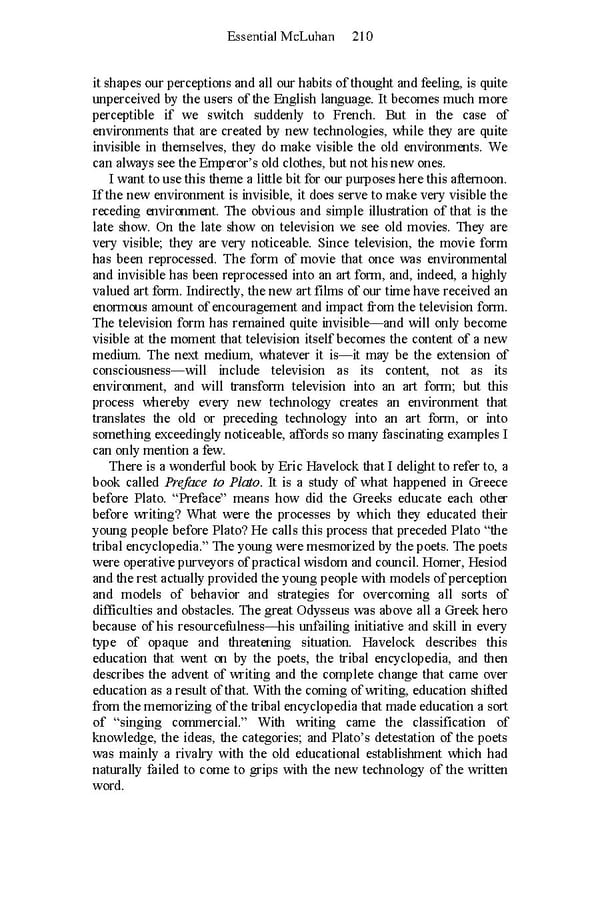Essential McLuhan 210 it shapes our perceptions and all our habits of thought and feeling, is quite unperceived by the users of the English language. It becomes much more perceptible if we switch suddenly to French. But in the case of environments that are created by new technologies, while they are quite invisible in themselves, they do make visible the old environments. We can always see the Emperor’s old clothes, but not his new ones. I want to use this theme a little bit for our purposes here this afternoon. If the new environment is invisible, it does serve to make very visible the receding environment. The obvious and simple illustration of that is the late show. On the late show on television we see old movies. They are very visible; they are very noticeable. Since television, the movie form has been reprocessed. The form of movie that once was environmental and invisible has been reprocessed into an art form, and, indeed, a highly valued art form. Indirectly, the new art films of our time have received an enormous amount of encouragement and impact from the television form. The television form has remained quite invisible—and will only become visible at the moment that television itself becomes the content of a new medium. The next medium, whatever it is—it may be the extension of consciousness—will include television as its content, not as its environment, and will transform television into an art form; but this process whereby every new technology creates an environment that translates the old or preceding technology into an art form, or into something exceedingly noticeable, affords so many fascinating examples I can only mention a few. There is a wonderful book by Eric Havelock that I delight to refer to, a book called Preface to Plato. It is a study of what happened in Greece before Plato. “Preface” means how did the Greeks educate each other before writing? What were the processes by which they educated their young people before Plato? He calls this process that preceded Plato “the tribal encyclopedia.” The young were mesmorized by the poets. The poets were operative purveyors of practical wisdom and council. Homer, Hesiod and the rest actually provided the young people with models of perception and models of behavior and strategies for overcoming all sorts of difficulties and obstacles. The great Odysseus was above all a Greek hero because of his resourcefulness—his unfailing initiative and skill in every type of opaque and threatening situation. Havelock describes this education that went on by the poets, the tribal encyclopedia, and then describes the advent of writing and the complete change that came over education as a result of that. With the coming of writing, education shifted from the memorizing of the tribal encyclopedia that made education a sort of “singing commercial.” With writing came the classification of knowledge, the ideas, the categories; and Plato’s detestation of the poets was mainly a rivalry with the old educational establishment which had naturally failed to come to grips with the new technology of the written word.
 Essential McLuhan Page 216 Page 218
Essential McLuhan Page 216 Page 218